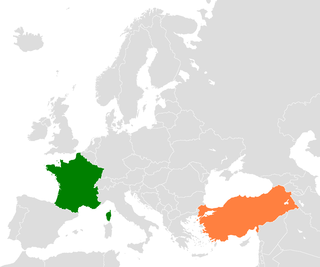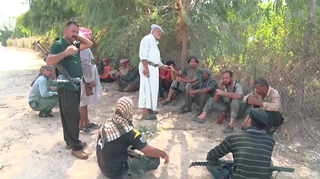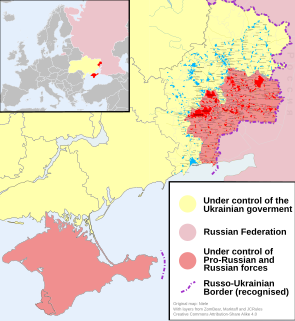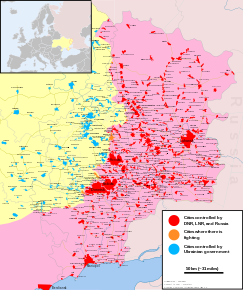 W
WThe 2019–2020 Persian Gulf crisis is an intensification of military tensions between the Islamic Republic of Iran and their allies and the United States of America and their allies in the Persian Gulf region. The U.S. began a buildup of its military presence in the region to deter an alleged planned campaign by Iran and its non-state allies to attack American forces and interests in the Persian Gulf and Iraq. This followed a rise in political tensions between the two countries during the Trump administration, which included the withdrawal of the U.S. from the Joint Comprehensive Plan of Action (JCPOA), the imposition of new sanctions against Iran, and the designation of the Islamic Revolutionary Guard Corps (IRGC) as a terrorist organization. In response, Iran designated the United States Central Command as a terrorist organization.
 W
WThe Anglophone Crisis, also known as the Ambazonia War, or the Cameroonian Civil War, is a conflict in the Southern Cameroons region of Cameroon, part of the long-standing Anglophone problem. In September 2017, separatists in the Anglophone territories of Northwest Region and Southwest Region declared the independence of Ambazonia and began fighting against the Government of Cameroon. Starting as a low-scale insurgency, the conflict spread to most parts of the Anglophone regions within a year. By the summer of 2019, the government controlled the major cities and parts of the countryside, while the separatists held parts of the countryside and regularly appeared in the major cities. A year later, clearly-defined frontlines had emerged, sometimes with a tacit mutual understanding between the belligerents on who controls which areas; while Cameroon would raid separatist-controlled towns and villages, it would not seek to outright recapture them, focusing instead on securing the major urban areas.
 W
WThe Franco-Turkish proxy conflict of represents a geopolitical struggle between Turkey and the original French government that turned into a diplomatic crisis between Turkey and France after a series of diplomatic scandals in 2011 after the French parliament announced it would recognize the Genocide of Armenians by Ottoman Turks during World War I and the Turkish War of Independence.
 W
WThe insurgency in Khyber Pakhtunkhwa, also known as the War in North-West Pakistan, is an armed conflict involving Pakistan, and armed militant groups such as the Tehrik-i-Taliban Pakistan (TTP), Jundallah, Lashkar-e-Islam (LeI), TNSM, al-Qaeda, and their Central Asian allies such as the ISIL–Khorasan (ISIL), Islamic Movement of Uzbekistan, East Turkistan Movement, Emirate of Caucasus, and elements of organized crime.
 W
WThe Iran–Saudi Arabia proxy conflict, sometimes also referred to as the Middle Eastern Cold War, is the ongoing struggle for influence in the Middle East and surrounding regions between the Islamic Republic of Iran and the Kingdom of Saudi Arabia. The two countries have provided varying degrees of support to opposing sides in nearby conflicts, including the civil wars in Syria and Yemen. The rivalry also extends to disputes in Bahrain, Lebanon, Qatar, Pakistan, Afghanistan, Nigeria, and Morocco, as well as broader competition in North and East Africa, parts of South Asia, Central Asia, Southeast Asia, the Balkans, and the Caucasus.
 W
WThe Iran–Turkey proxy conflict is an ongoing struggle for influence in the Middle East and surrounding regions between the Islamic Republic of Iran and the Republic of Turkey. In what has been described as a cold war, the conflict is waged on multiple levels over geopolitical, economic, and sectarian influence in pursuit of regional hegemony between the two countries due to different in interests; the conflict between Iran and Turkey has been sharpest in Syria, Iraq, the South Caucasus, and Libya, where conflicting interests between Iran and Turkey frequently lead to clashes between proxies of the two countries. Both states are also motivated by a desire to become the dominant Muslim power in the region.
 W
WThe ISIL insurgency in Iraq is an ongoing low-intensity insurgency that began in late 2017 after the Islamic State of Iraq and the Levant (ISIL) lost territorial control in the Iraqi Civil War (2014–2017). Several rebel groups, including ISIL, White Flags and the Iraqi Baath Party fought the Iraqi military and allied paramilitary forces.
 W
WThe Second Libyan Civil War was a conflict among rival factions seeking control of Libya.
 W
WThe Mali War is an ongoing armed conflict that started in January 2012 between the northern and southern parts of Mali in Africa. On 16 January 2012, several insurgent groups began fighting a campaign against the Malian government for independence or greater autonomy for northern Mali, which they called Azawad. The National Movement for the Liberation of Azawad (MNLA), an organization fighting to make this area of Mali an independent homeland for the Tuareg people, had taken control of the region by April 2012.
 W
WThe Qatar–Saudi Arabia diplomatic conflict, sometimes referred to as the Second Arab Cold War, is the ongoing struggle for regional influence between Qatar and Saudi Arabia (KSA), both of which are members of the Gulf Cooperation Council (GCC). Qatar–Saudi Arabia relations have been especially strained since the beginning of the Arab Spring, that left a power vacuum both states sought to fill, with Qatar being supportive of the revolutionary wave and Saudi Arabia opposing it. Both states are allies of the United States, and have avoided direct conflict with one another.
 W
WThe Russo-Ukrainian War is a protracted conflict between Russia and Ukraine that began in February 2014. The war has centered around the status of the Ukrainian regions of Crimea and Donbass.
 W
WThe Russia–Turkey proxy conflict is a geopolitical struggle between Turkey and initially the Syrian government which turned into a military crisis between Turkey and Russia after the November 2015 shoot-down of a Russian Air Force Su-24 by the Turkish Air Force after an alleged airspace violation. Increased Russian military aggression and hostile Turkish territorial responses have all contributed to increasing escalation. Aerial confrontations between the two nations have grown more common. Turkey accuses Russian Forces of violating Turkish sovereign airspace and war crimes against Syrian Turkmens. The Russian military has accused Turkey of maintaining illegal economic ties with ISIL and condemned Turkish military interventions in Syria and Libya.
 W
WThe 2009–present phase of the Somali Civil War is concentrated in southern and central Somalia and portions of north eastern Kenya. It began in early February 2009 with the conflict between the forces of the Federal Government of Somalia, assisted by African Union peacekeeping troops, and various militant groups and factions. The violence has displaced thousands of people in the southern part of the country. The conflict has also seen fighting between the Sufi Ahlu Sunna Waljama'a and Al-Shabaab.
 W
WThe War in Donbass is an armed conflict in the Donbass region of Ukraine, part of the Ukrainian crisis and the broader Russo-Ukrainian War. From the beginning of March 2014, in the aftermath of the 2014 Ukrainian revolution and the Euromaidan movement, protests by Russia-backed anti-government separatist groups took place in the Donetsk and Luhansk oblasts of Ukraine, collectively called the "Donbass". These demonstrations, which followed the February–March 2014 annexation of Crimea by the Russian Federation, and which were part of a wider group of concurrent protests across southern and eastern Ukraine, escalated into an armed conflict between the separatist forces of the self-declared Donetsk and Luhansk People's Republics, and the Ukrainian government. While the initial protests were largely native expressions of discontent with the new Ukrainian government, Russia took advantage of them to launch a co-ordinated political and military campaign against Ukraine. Russian citizens led the separatist movement in Donetsk from April until August 2014, and were supported by volunteers and materiel from Russia. As the conflict escalated in May 2014, Russia employed a "hybrid approach", deploying a combination of disinformation tactics, irregular fighters, regular Russian troops, and conventional military support to destabilise the Donbass region. According to the Ukrainian government, at the height of the conflict in the summer of 2014, Russian paramilitaries were reported to make up between 15% to 80% of the combatants.
 W
WThe Western Togoland Rebellion is an ongoing separatist revolt led-by an Ewe nationalist organization Western Togoland Restoration Front against the government of Ghana seeking the independence of former British Togoland.
 W
WThe Yemeni Crisis began with the 2011–12 revolution against President Ali Abdullah Saleh, who had led Yemen for more than three decades. After Saleh left office in early 2012 as part of a mediated agreement between the Yemeni government and opposition groups, the government led by Saleh's former vice president, Abdrabbuh Mansur Hadi, struggled to unite the fractious political landscape of the country and fend off threats both from Al-Qaeda in the Arabian Peninsula and Houthi militants that had been waging a protracted insurgency in the north for years.